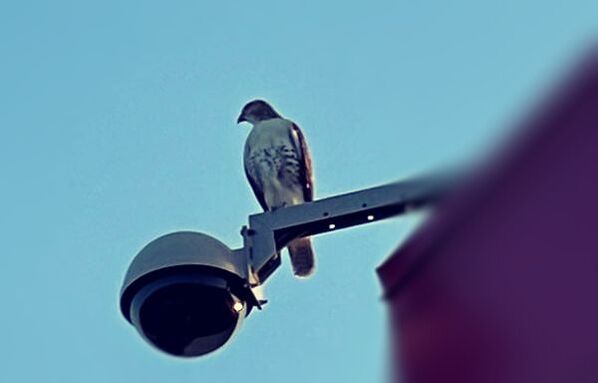 My gasp is a question that my daughter answers: Yes, those were babies. And she wonders-- Where were they going? Five young possum and their mother, still among the forgotten shoes and plastic bags of 8th Street. My son begs us to stop.
I thought you saw a puppy, he says. I thought you saw a bird. But what I saw was a grave, and we didn’t hold our breath like when we pass a field of crosses, and the bad luck will surely come. On the radio they tell us about the guns: the child that shot their teacher the boy that shot his mother the man that shot the grocery store the motorists that shot each other. But we don’t need the news to tell us what we already know: that gunshots sound different than fireworks and the alley is full of casings and the anger in our city is a weapon. We dial the volume down and choose beauty instead-- the peregrine perched on the light post, the ice growing into lace on our windshield, the sun filtered through factory exhaust, the waving winter grasses poking through rusted chain-link. Today, though, we brake next to death and inhale the fumes of our city’s sorrow. We are out of practice with grief. Even when cities were crying on their windowsills, even then-- we didn't hear what the dead were telling us. And in Senegal, when a bus killed 44, the whole nation entered three days of mourning, and I wonder: What might be healed here if we sat with the agony of our losses? But we are not a people that mourn: 214 dead already but we rage against potholes and prices instead, against taxes and tickets, but not the dead. They are untended and unmarked. Unremarkable in the sheer volume of loss. We do not tend to our dead or even our living: as if we do not hear the incessant whine of the sirens, as if we are not locked behind fears that we, too, will be an unremarkable loss. We catalogue deaths-- 10 at a dance festival 21 at a school 6 at a parade 7 at work in the fields -- But we do not mourn. Today, though: the red light stops us and we cannot look away. And I wonder, were they headed home, mother and children, across the highway to where the river reminds us of the wild that once was: where coyotes still howl between tents and settlements where turkeys still leap into trees when dogs run free where fawns are still hidden safe from mountain bikes where trout still run and hawks still hunt and a woodpecker’s red still flashes past the leaking aqueduct that reeks of sewage? Except: my children know about the summer murders there, and my neighbor tells us how needles wend their way up the river’s hill to her children’s tree fort, and we are weary of water that poisons more than it nourishes. Even in this thicket of wild living, our city is unforgiving. And I won’t mention to my children the baby raccoon that the neighbor could not save or the nest of wrens that blew to their end after the thunder. And I won’t mention to my children the missing young people or my student’s father, killed at home. I won’t mention the swerving car last night or how my phone pings with relentless warnings. I won’t mention any of this, but still: they know. Because they remember when we hid in the closet and they remember their father during the lockdown and they practice their own ends at school. They know, but still: my son hoped that my gasp was delight. She lays in the street between white dashed paint, a mother like me, shuttling our young in search of safe harbor. I look at her. I see her. And I grieve.
1 Comment
Melissa Sals
10/26/2023 04:48:57 pm
Oh, my heart. How I mourn this broken world we raise our children in. Your poem rings the bell of truth - the hardest kind.
Reply
Leave a Reply. |
AboutWhile living in Mexico, I joked that speaking Spanish forced me to be far more Zen about life: Since I could only speak in the present tense, I was forced to just live in that present tense. Archives
October 2023
Categories
All
photosLike what you see? That's mostly Ross Freshwater. Check out my talented partner-in-life's photo gallery. |
 RSS Feed
RSS Feed